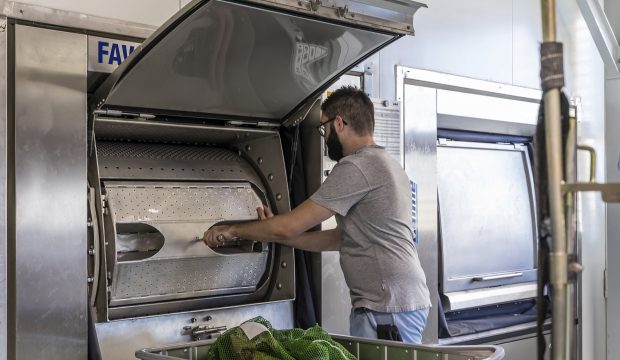
How hazardous are nurses’ uniforms? DMU and TSA call for change in NHS guidance
‘World class’ research shows domestic washing machines are inadequate decontaminators
Over 700,000 nurses in the UK wash their uniforms at home. The figure is even higher when you take into account other healthcare workers. The NHS encourages nurses to maintain and care for healthcare workwear at home, even where outsourcing to a commercial laundry is available. However, new research carried out be De Montfort University (DMU), supported by the Textile Services Association (TSA), suggests that this practice is hazardous, proving that some domestic machines are not up to the task of decontaminating clothes. Now DMU and TSA are calling on the NHS to change the guidance.
The research (Variable decontamination efficacy of domestic washing machines: potential risks for home laundering of healthcare uniforms) was carried out by DMU’s Infectious Disease Research Group, with funding from the TSA. It was presented at the Infection Prevention Society (IPS) Conference in October 2022.
The aim of the research was to assess the ability of home washing machines to meet the minimum disinfection standards set by the NHS in HTM 01-04 (Decontamination of linen for health and social care, updated 31/08/2021). Six different domestic models were used, of different ages and manufacturers, to ensure the ‘real world’ authenticity of the testing. In addition, DMU and TSA developed an accurate methodology that is able to validate the ability of a washing process to disinfect textile products – especially those used in healthcare, food manufacturing, pharmaceuticals and other sectors where there is a need for high-care textile maintenance.
The results confirmed the inadequacy of domestic washing machines to consistently achieve the essential requirements of heat, chemistry and mechanical action required for decontamination. NHS Guidelines recommend that healthcare workers launder their uniforms at 60C. In fact, in the tests, none of the machines actually got up to 60C, either on standard or rapid wash programmes. It shows that healthcare workers taking their uniforms home to wash cannot be confident, at the end of the wash, that their uniform has been fully disinfected. This leaves their households under risk of cross contamination from pathogens that they may bring home from work.
“The TSA has always argued that nurses’ uniforms should be washed professionally,” says David Stevens, CEO at the TSA. “PHE (Public Health England) and other departments have said there was not enough evidence to prove the inadequacy of domestic washing machines.
“Well, there is now. And it’s based on world-class research from some of the most respected names in the field of infectious diseases.”
TSA believes that the NHS will have to change its polices in the light of the research. “The need to change is even more pressing given the huge rise in energy prices,” says Stevens. “HMRC policies allow healthcare workers to be given allowances to launder unforms at home. But these no longer cover the costs, so they are out of pocket as well.”
Moreover, TSA believes the required shift in management practices will be good news for the NHS. “Washing in commercial laundries, whether on site or outsourced, will result not only in safer homes and workplaces, but also offer the NHS significant efficiencies and economies of scale,” says Stevens.
For more information on DMU visit dmu.ac.uk
.
